Before the revolution, D.O. Ott was a court obstetrician; it happened that he sat at the chess table with the emperor himself.For his help to the Empress, who became the mother of five children, he was granted a plot of land on Vasilyevsky Island in St. Petersburg, where he founded the future research institute of Obstetrics, Gynecology and Reproductology, which is currently one of the leading European centers.Ott symbolized the passing of the baton of advanced Russian science to Kuban obstetricians and gynecologists.From 1921 to 1933, the department was headed by Professor Konstantin Davidovich Vachnadze and Doctor of Medicine, Professor Nikolai Vladimirovich Voitsekhovsky.During the period from 1928 to 1933, employees of the Department of Obstetrics and doctors of the maternity hospital published the first 14 scientific works on the problems of the pathology of pregnancy, pathological childbirth, and the treatment of diseases of the uterus in the postpartum period in the Kuban Scientific and Medical Bulletin.
Obstetrics, gynecology and perinatology No. 1

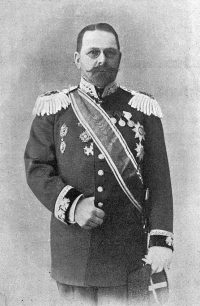
The Department of Obstetrics and Gynecology was officially opened in September 1920.The country's largest specialist, Professor Dmitry Oskarovich Ott, author of hundreds of works, including several monographs on practical gynecology, and founder of the Russian Society of Obstetricians and Gynecologists, was invited to lead it.At the beginning of the 20th century, for a population of more than 3 million in Kuban, there were only 214 doctors and 577 paramedics from all departments.Among the local medical staff in service, 106 “midwives” were officially listed (taken from the “Report of the head of the Kuban region and the ataman of the Kuban Cossack army for 1915”).There were no women's health facilities; perinatal mortality was more than 63%.Therefore, the opening of a medical university in Krasnodar was caused by a burning need.
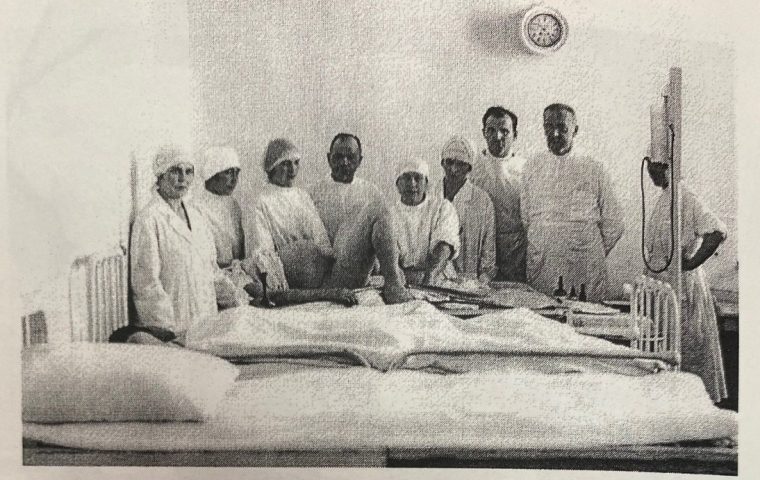
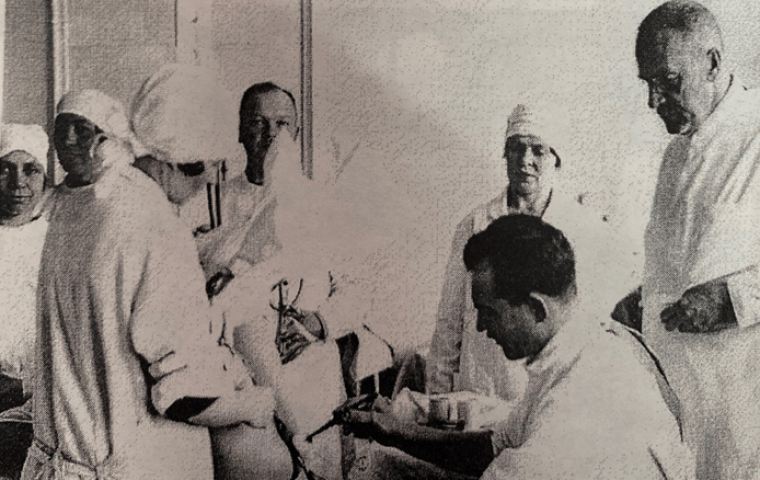
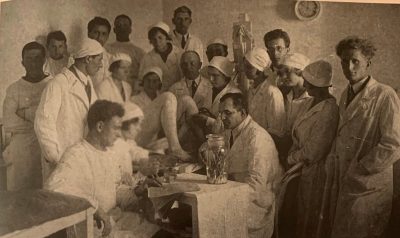
In 1934, the department was headed by Professor Georgy Maksimovich Feyertag.The main scientific research of the department during this period: diagnosis and therapy of ectopic pregnancy, pain relief in gynecology, improvement of methods and techniques for combined treatment of cervical cancer, including the use of electric knife.25 scientific papers were published.The work of the scientific student circle continued and problems were developed on “Diagnostics and therapy of ectopic pregnancy”, “drug pain relief for childbirth”, “improving the combined treatment of cervical cancer”.25 scientific papers were published.By 1940, the staff of the Department of Obstetrics had grown to 10 units.A systematic course in obstetrics was taught by M.N.Kirievsky and G.M.Feiertag, practical classes were conducted by assistants at the bedsides of pregnant women, women in labor and postpartum women.The student circle gathered up to 80 people within its walls.An important aspect of the department’s work was constant communication with the regions of the region, providing qualified medical care to patients, giving lectures, conducting consultations, and participating in determining the blood groups of the population.During the Great Patriotic War, the department as part of the institute was evacuated and worked successfully first in Yerevan and then in Tyumen.Employees of the department - assistants Martyn Nikolaevich Kireevsky and Danil Vyacheslavovich Kolinko were mobilized to the front and were the heads of large military hospitals.For his exemplary performance of service, Kolinko was awarded the Order of the Red Star and the medal “For the Defense of the Caucasus.”Kirievsky designed horse-drawn pack stretchers for transporting the wounded in mountainous areas at the front.After the liberation of Kuban from the fascist invaders, in the fall of 1943, despite the destruction of buildings, the destruction of laboratories and the library, students began studying without delay.
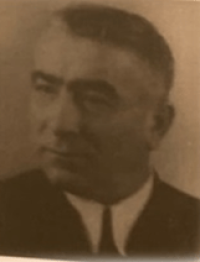
In 1951, Doctor of Medical Sciences, Professor Ervand Sarkisovich Akopyan was elected head of the department.The department worked on current scientific problems: trauma during childbirth and its prevention, prevention of postoperative complications, artificial formation of the vagina from the rectum.From November 1962 to July 1963, the department was headed by D.V.Kolinko.
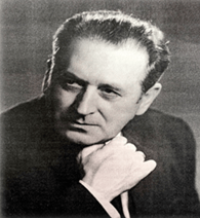
Since 1963, Alexander Mikhailovich Kilimnik was elected head of the department.Under the guidance of Professor A.M.Kilimnik, the department’s staff has been working for many years on scientific problems related to the treatment of menstrual dysfunction, allotransplantation of ovarian and endometrial tissue, as well as the issue of preservation of donor tissue.Another important area of scientific research in the work of the department was the conservative-surgical direction in the treatment of gynecological patients; working conditions and their impact on reproductive function in women of the Krasnodar region, issues of pediatric and adolescent gynecology, and genital tuberculosis were studied.In total, under the guidance and participation of Professor A.M.Kilimnik defended 5 doctoral and 17 candidate dissertations over 24 years of work.
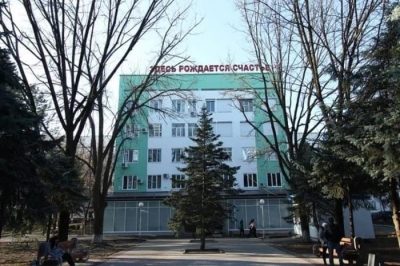
In 1984, the main base of the department was the Maternity Hospital No. 5 of the State Budgetary Institution of Healthcare of the Kyrgyz Republic.The department was directly involved in organizing its work.On the initiative of the department, the country's first Perinatal Center was created.The idea of his education and his work were awarded the Gold Medal of the USSR Exhibition of Economic Achievements.

From 1988 to 2009, the department was headed by Doctor of Medical Sciences, Professor Boris Grigorievich Ermoshenko.The main scientific directions of the department: a comprehensive system of forecasting, early diagnosis and treatment of reproductive disorders, endoscopic methods of diagnosis and treatment of gynecological patients.During this period, the staff of the department defended a doctoral dissertation and ten candidate dissertations.213 articles were published, 3 patents for inventions were received, 27 rationalization proposals were drawn up.In 1992, the department was the basis for the creation of the Center for Maternal and Child Health at the institute (since 1994 - “Basic Obstetrics and Gynecology Clinic.”
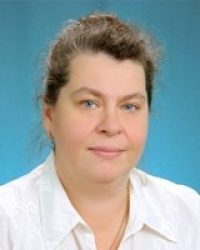
In 1997, by dividing the educational department of obstetrics and gynecology, the department of obstetrics, gynecology and perinatology was formed.This department was headed by Doctor of Medical Sciences, Professor Irina Igorevna Kutsenko.The staff of the department carried out the research program “Current problems of women’s reproductive health.”Its main areas: diagnosis and treatment of genital endometriosis;regulatory and adaptive capabilities of the body during the physiological and pathological course of pregnancy and childbirth, gynecological pathology;urogenital infection in obstetrics and gynecology, immunology of reproduction, perinatal neurology.
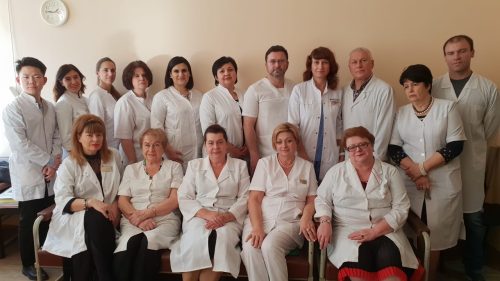
Since February 2010, in order to optimize the educational process, ensure a unified methodological approach to teaching, introduce modern technologies into the diagnostic and treatment process and determine the general scientific direction in the discipline of obstetrics and gynecology, the department of obstetrics and gynecology of the university has been attached to the department of obstetrics, gynecology and perinatology.Head of the department – Doctor of Medical Sciences, Professor I.I.Kutsenko.Clinical bases of the department: GBUZ KKB No. 2 Perinatal Center, GBUZ DKKB Perinatal Center, GBUZ RD, GBUZ Emergency Hospital, Clinic of the Federal State Budgetary Educational Institution of Higher Education Kuban State Medical University.Under the leadership of I.I.Kutsenko is currently carrying out two comprehensive research projects: “Ways to preserve women’s reproductive health with the most significant obstetric and gynecological pathologies”, “Immunology of reproduction”.The main aspects of the immune status in various gynecological pathologies and the possibility of correction are studied.Professor Kutsenko I.I.is the author and co-author of 66 scientific publications, including 46 journal articles in peer-reviewed publications of the Higher Attestation Commission and 12 - SCOPUS.In total, over the past 10 years, employees of the department, under the leadership of the head, have published 130 scientific works, including in the central and foreign press.The department annually takes part in federal, regional interuniversity scientific, practical and educational conferences.Under the leadership of I.I.Kutsenko department participated in the organization and holding of conferences on current problems of obstetrics and gynecology: 18 international, 36 all-Russian and 48 regional conferences.Over the past 5 years - 142 scientific reports by department employees on the topic of research, 20 acts of implementation and 2 patents for inventions.Under the leadership of Kutsenko I.I.employees of the department Rubinina E.R.(in 2022) and Gorring H.I.(in 2023) dissertations for the academic degree of Candidate of Medical Sciences were successfully defended.Postgraduate students of the department participated in the XVIth All-Russian Scientific and Practical Conference “Young Scientists in Medicine”, Kazan, 2011.(III degree diploma);IX Scientific and Practical Conference of Young Scientists and Students of the South of Russia “Medical Science and Healthcare”, Krasnodar, 2011.(1st degree diploma);International Congress “Early Pregnancy”, Moscow, 2012.(II degree diploma);2021 victory in the “UMNIK” competition;2022 Governor's competition of youth innovative projects "IQ Award of the Year", 2nd place;2022 victory in the “UMNIK” competition;2023 competition “CONUNITY: Youth.Talent.Innovation."1st place A team of students (members of the SSS) annually participates in the All-Russian Olympiad in Obstetrics and Gynecology in Moscow.In 2018, a team of students was awarded a 3rd degree diploma for participation in the II All-Russian Student Olympiad in Obstetrics and Gynecology named after.L.S.Persianinova.In 2019 and 2020our team took 1st place in 2022.– 2nd place in the All-Russian Student Olympiad in Obstetrics and Gynecology named after.L.S.Persianinova.

